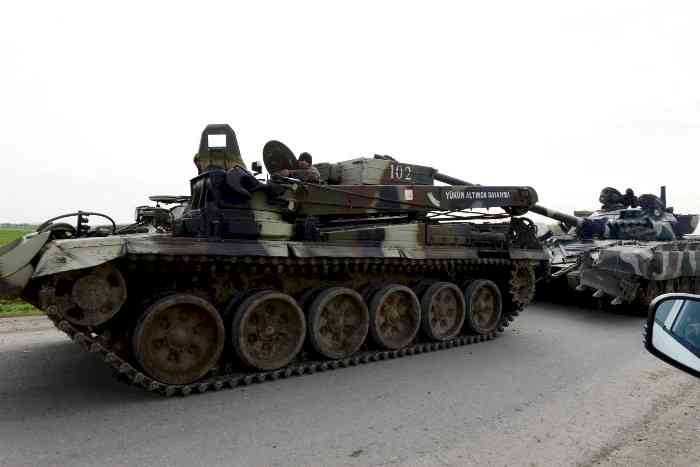Turkey needs to review its policy towards Central Asia
The recent events in Kazakhstan which witnessed action by Russia as a lead member of the CSTO (Collective Security Treaty Organisation) comprising Russia, Armenia, Kazakhstan, Kyrgyzstan, Tajikistan, and Uzbekistan has been a revealing factor for Turkey and has given the country an opportunity to review its role in the Central Asian region.

New Delhi, Feb 6 (IANS) The recent events in Kazakhstan which witnessed action by Russia as a lead member of the CSTO (Collective Security Treaty Organisation) comprising Russia, Armenia, Kazakhstan, Kyrgyzstan, Tajikistan, and Uzbekistan has been a revealing factor for Turkey and has given the country an opportunity to review its role in the Central Asian region.
While Turkey has been vying for influence in Central Asia playing the Turkic card and leveraging the potential of the Turkic connect ever since the independence of these states in1991, in situations such as the political disturbance that Kazakhstan witnessed recently, Turkey remained a mere witness without any ability to contribute to defending Kazakhstan or facilitating any form of assistance to the Kazakhs.
Turkey has invested significantly in the Central Asian States (CASs) over the years, also ensuring intense Turkic cultural influence on these states. Besides trade and investment, Turkey has also systematically expanded its relations with each of these states focusing on the bilateral aspect as relevant to each of the CASs. Turkey has thus attained considerable visibility in these states and buoyed by this strong pro-Turkish sentiment prevalent in these states, Turkey went ahead to form the Organisation of Turkic States (OTS) which was earlier known as the 'Turkic Council'.
The change in the name from a 'Council' to an 'Organisation' drew the attention of the Russians as they felt this move was intended to form a more closer bond by Turkey with these countries.
There is no doubt that Turkey's intention has been to include the CASs as part of its larger strategic goal of forming a strong bond between nations with a Turkic language base and drawing them under its influence. However, with Russia regaining its capability to play a more meaningful role in the central Asian region in the last few years, Turkish activities in the CASs have been seen as intrusive by the Russians. Russia considers the Central Asian region as its backyard and would prefer neither China nor Turkey to play any dominating role in the region.
Russia has also been able to smartly leverage the fear and anxiety among the CASs as a result of the developments in Afghanistan by assuring the CASs of providing security to them. Russia has thus been able to establish a strong bond with the CASs in the last few years binding them as part of the CSTO, besides enhancing bilateral engagement with each of these states.
Turkey and Kazakhstan
As far as Kazakhstan is concerned Turkish investment over the years has been significant, besides the fact that Turkey was one of the first nations to recognise the independence of Kazakhstan. In 2009, Turkey and Kazakhstan signed a "Strategic Partnership Agreement" which resulted in Turkey becoming one of the most important political and economic partners of Kazakhstan in the region.Bilateral relations between the two countries include multifarious aspects such as trade, investment, culture, tourism, health, education and military issues based on the principle of mutual benefit. The total amount of investments made by Turkey in Afghanistan has touched $3.2 billion with both countries setting their common goal to increase this figure to $5 billion in the first stage and then to $10 billion. Turkey also offers attractive scholarships to Kazakh students and thus far more than 4,000 Kazakh students have studied in Turkey under this scholarship programme.
Given this background, Turkey was caught in a difficult situation when the turmoil started in Kazakhstan and the Russians acted fast, side lining the Turks in any effort that they might have considered in dealing with the situation.
Soon after the developments in Kazakhstan took an ugly turn, the Turkish foreign minister Mevlut Cavusoglu announced that the Orgnisation of Turkic States (OTS), made up of Azerbaijan, Kazakhstan, Kyrgyzstan, Turkey and Uzbekistan would look into the situation in Kazakhstan, and was ready to offer any help it needed to overcome the security crisis. Turkey also organised a virtual meeting among the OTS member states to discuss the situation in Kazakhstan.
The Turks sent out several signals to the Kazakhs for any assistance that they might need in the given situation.
It was also interesting to note the somewhat hawkish statements the Turkish Defense Minister Hulusi Akar made during the Kazakh situation when he mentioned that "We believe that our brothers will overcome all difficulties with their own means and abilities. We declare that we are ready to provide all kinds of assistance and support to our Kazakh brothers".
Significantly, Hulusi Akar went on to highlight Turkish successes in counter terror operations in Syria. He mentioned that since 2015 the Turkish Armed Forces had eliminated 33,275 terrorists in Syria, and ensured return of large number of refugees to Idlib.
The Syrian reference was naturally made in the context of Russian activities in Syria.
Significantly, the Defence Minister did not lose the opportunity to criticize Russia's role in Syria stating that the Russian Air Force has been periodically striking the North West of Syria causing irreparable damage and worsening the living conditions of local Syrians in the region. The tone and tenor of the Defence minister was clearly aimed at projecting the Russians as very intrusive with no concern for humanitarian aspects leading to adverse impact on the local population in Syria. By implication thus the Defence Minister has been trying to draw a parallel between the Russian action in Kazakhstan and Syria.
At the same time, he referred to the Turkish role during the Karabakh conflict highlighting the Turkish capability to intervene in the Caucasus region close to Central Asia.
Future course
In this backdrop, some Turkish experts feel that the introduction of the CSTO troops by Russia inKazakhstan marks the collapse of the Turkish dream of building a "Turkic world". They feel that the enormous investments made over the years by Turkey in Kazakhstan would not ensure proportionate returns in the coming years. Turkish experts and political analysts have been urging the government to take a careful relook at the latest developments in Kazakhstan and reframe their policy towards Central Asia accordingly.
Given the overwhelming Russian role in the region, Turkey might not be able to sustain its perceived long term objectives of forming a close grouping of Turkic nations that would enable them to play a more assertive role in the region.
While the OTS formed by Turkey is not a military security alliance, in case of the CSTO the basis of formation of this organization is 'collective security' and hence the ability of the CSTO to intervene militarily in the Central Asia region if the situation so warrants. Moscow would thus further strengthen this bond using the Kazakh incident as a classic case of how the CSTO can be effective in bailing a Central Asian State from crisis.
Developments in Kazakhstan thus have long term implications for the region as a whole and has been a wakeup call for the Turks in terms of the overall strategic depth they have been seeking in Central Asia. Moreover, given Russia's increasingly dominating role in the region, any aggressive posturing by Turkey in the region would place them at odds with the Russians, which is not a preferred option. Under the circumstances, there is no doubt Turkey would have to take a relook at its policy towards Central Asia and reframe the same to suit the present situation.
Turkey has grand plans for Kazakhstan and in the language of the Turkish Ambassador to Kazakhstan, Ufuk Ekici in the next 10 years Turkey and Kazakhstan plan to take their relations to a new level covering areas such as high-tech, aerospace and satellite production, besides improving relations in the field of digitization and e-governance between Kazakhstan and Turkey. However, the latest developments in Kazakhstan and the lack of ability of Turkey to play any role in assisting Kazakhstan is bound to have an effect on Turkey's long term policy on Central Asia as a whole.
Turkey's dreams if any of seeking strategic depth in the region has certainly got a hit -- at least for some time to come.


 IANS
IANS 








